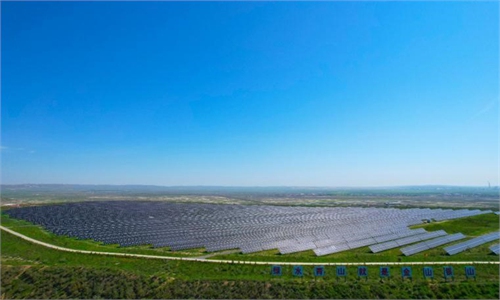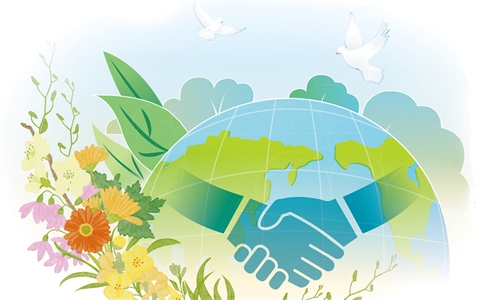As 2025 begins, head-of-state diplomacy brings confidence and strength: Global Times editorial

Photo: GT
The year 2025 is destined to be significant, marking the 80th anniversary of the victory in the Chinese People's War of Resistance Against Japanese Aggression (1931-45) and the World Anti-Fascist War, the founding of the United Nations, as well as the 50th anniversary of China-EU diplomatic relations. As the rotating chair, China will also host the Shanghai Cooperation Organization summit this year. At the very start of the year, China's series of diplomatic actions has drawn global attention, with head-of-state diplomacy at the leadership level being particularly noteworthy.
From the beginning of the year, head-of-state diplomacy has set the tone for China's comprehensive major-country diplomacy. Chinese President Xi Jinping had a virtual meeting with Russian President Vladimir Putin, held telephone conversations with then US President-elect Donald Trump and President of the European Council Antonio Costa, exchanged congratulatory messages with General Secretary of the Communist Party of Vietnam Central Committee To Lam and Vietnamese President Luong Cuong, and welcomed Sri Lankan President Anura Kumara Dissanayake on a visit to China. Through this head-of-state diplomacy, strategic guidance has been charted, unveiling a vivid landscape of China's comprehensive, multilevel, multifaceted major-country diplomacy. This impressive round of head-of-state diplomacy has brought both reassurance and hope to the world.
In less than a month, people have observed that the interactions with China by these countries and institutions are rooted not only in bilateral relations but also extend beyond bilateral frameworks, carrying regional and even global significance. These nations and institutions play multiple roles on the world stage. For instance, the US is a superpower, while both the US and Europe are traditional allies within the Western bloc. Russia and Vietnam are friendly neighbors of China; Russia is a BRICS member, whereas Russia, Vietnam and Sri Lanka are part of the "Global South." This precisely reflects the complexity of today's multipolar world. Regardless of these countries' systems or sizes, China develops cooperative relations with them based on mutual respect and equal treatment.
The world is advancing amid a mix of turbulence and interweaving complexities. Humanity continues to face severe challenges such as peace deficits, development deficits, security deficits and governance deficits. Conflicts and confrontations in international relations are becoming increasingly apparent under the influence of geopolitical factors. The international community perceives risks from these significant challenges and issues and calls for change.
In this context, practices and philosophies of major country diplomacy with Chinese characteristics, guided by head-of-state diplomacy, have emerged as a "clear stream," playing an increasingly prominent role in supporting global peace and development. A defining feature of this approach is that China's development of relations with other countries is never centered on confrontation. Instead, it seeks peaceful development and win-win cooperation. This fundamentally differs from the diplomatic behavior of some major powers throughout history and stands in stark contrast to them.
Chinese leaders emphasize friendship and trust most in their talks with other countries, and the broadest consensus formed is cooperation and win-win outcomes. They aim to maintain overall stability in major power relations while working hand in hand with neighboring countries to build a peaceful, secure, prosperous, beautiful, and mutually beneficial Asian community. Additionally, they are committed to harnessing the tremendous strength of the "Global South" for self-improvement and unity. Furthermore, Chinese leaders actively engage in friendly initiatives directed at the peoples of other countries, solidifying public support for national interactions. Such a responsible major power, possessing international influence, innovative leadership, and a strong moral appeal, is unprecedented.
It should also be noted that China's great power responsibility lies not only in strengthening its relationships with other major powers but also in promoting the shared responsibility of all major powers for the world. For example, China's enhancement of strategic interactions with the US is aimed not only at resolving issues in China-US relations but also at promoting and facilitating global stability through the stabilization of China-US relations. As an important force in a multipolar world, the cooperation and deepening of ties between China and Europe, as well as between China and Russia, is, in fact, providing support for global strategic stability. On the occasion of the 80th anniversary of the United Nations, China will continue to strengthen international cooperation through platforms and mechanisms such as the United Nations, the Shanghai Cooperation Organization, BRICS, and the G20, actively participate in global governance, and play an important role in maintaining world peace and stability.
President Xi pointed out in his New Year message: "As changes unseen in a century accelerate across the world, it is important to rise above estrangement and conflict with a broad vision, and care for the future of humanity with great passion. China will work with all countries to promote friendship and cooperation, enhance mutual learning among different cultures, and build a community with a shared future for mankind. We must jointly create a better future for the world."
In the face of a world filled with intertwined changes and turmoil, countries need to take proactive actions to jointly maintain peace, stability, and prosperity in our shared home. China will always play an important role as a pillar in this endeavor.



